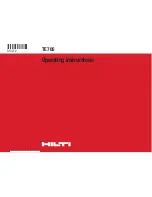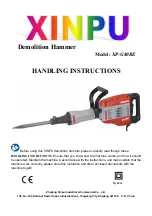
8 — English
STRAIGHT CUT
See Figures 7 - 8, page 12.
A straight cut can be made by clamping a piece of wood or
straight-edge to the workpiece and guiding the edge of the
saw against it. Make the cut from one direction only. Don’t
cut halfway and complete the cut from the opposite end.
You can also use the edge guide as shown in figure 8. Loosen
the thumb screw and insert the end of the edge guide through
the two slots in the base. Measure the distance to cut and
tighten the thumb screw. Place the edge guide on the outside
edge of the workpiece and cut in a straight path.
WARNING:
To avoid possible serious injury, keep hands and fingers
from between the gear housing and saw blade clamp,
and keep the guard in place.
WARNING:
Excessive side pressure to the blade could result in bro-
ken blades or damage to the material being cut.
OPERATION
LED LIGHT
See Figure 5, page 12.
The LED light illuminates when the switch trigger is depressed
to give you a clear view of the cut line on your work surface.
GENERAL CUTTING
Rest the front of the saw base on the workpiece and align
cutting edge of the blade with the line on your workpiece.
Make sure the power cord is out of your way and not in the
line of cut. Start the saw and move it forward on the work
surface. Apply downward pressure to keep the saw steady
and only enough forward pressure to keep the blade cutting.
Do not force the saw.
Applying too much forward pressure
to the saw may overheat the motor and break saw blades.
ORBITAL MOTION
See Figure 6 , page 12.
The blade of the saw cuts in an orbital motion. This feature
is adjustable and provides faster, more efficient cutting. With
orbital motion the blade cuts through your work in the upstroke
but does not drag across your work in the downstroke. To
adjust the orbital motion, rotate the orbital adjustment knob
to the desired setting. Refer to the chart below to find the
right setting for the job you are attempting.
NOTE:
Setting the orbital position to a lower setting will
result in a smoother finish but slower cut. A higher setting
will result in a rougher finish but faster cut.
Orbital
Setting
Material
Type
Suggested
Blade Type
TPI
(Teeth per inch)
Speed
Setting
Orbital
Action
0
Counter Top,
Laminate Board
Wood Cutting Blade
10-12 (Down
Stroke Blade)
Max Speed
No Orbit
Thin Sheet Metal
Metal Cutting Blade
14-24
Slow - Medium
Speed
No Orbit
1
Plastics and PVC
Wood Cutting Blade
10-12
Medium Speed
Minimal Orbit
Scrolling or
Curving Cuts in Wood
Scrolling Wood Blade
10-12
Max Speed
Minimal Orbit
2
Plywood, Decking
and Hardwood
Wood Cutting Blade
6-12
Medium -
Max Speed
Medium Orbit
3
General Lumber
and Soft Wood
Wood Cutting Blade
6-10
Medium -
Max Speed
Maximum Orbit









































